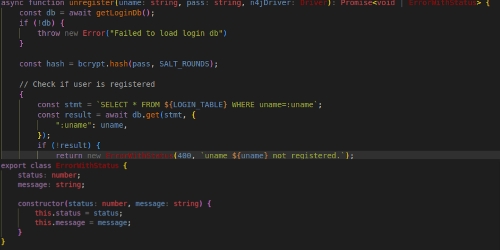Published
- 2 min read
ExpressJS Error Handling

The Problem
You need to handle 2 different major types of errors when hosting a server using ExpressJS; HTTP errors and logic errors. You would like to not crash when request processing fails, but also don’t want to pollute your codebase with try-catch blocks.
The Solution
The pattern I’ve settled on (for the moment) is to handle the request the inside a (usually async) function within the routing call, sending status with .then() if if the request handling succeeds, but .catch() and pass to next() if there is an error. This way, I can simply call throw <error> inside the request handler function, and any errors, whether manually thrown or not, will end up at the custom error handler middleware.
router.post('/', async (req: Request, res: Response, next: NextFunction) => {
const neo4jDriver: Driver = req.n4jDriver
const email: string = req.body.email || ''
const uname: string = req.body.uname
const pass: string = req.body.pass
if (!uname || !pass) {
throw {
status: 400,
message: 'Username and password required.'
}
}
register(uname, pass, email, neo4jDriver)
.then(() => {
res.sendStatus(200)
})
.catch((e: any) => {
next(e)
})
})register() (aka, the request handler function):
async function register(
uname: string,
pass: string,
email: string,
n4jDriver: Driver
): Promise<void> {
const loginDB = await getLoginDb()
if (!loginDB) {
throw new Error('Failed to load login db')
}
// Check if user already registered
const stmt = `SELECT * FROM ${LOGIN_TABLE} WHERE uname=:uname`
const result = await loginDB.get(stmt, {
':uname': uname
})
if (result) {
throw {
status: 400,
message: `uname ${uname} already registered.`
}
}
}Since we’re just calling next() with the error when one is thrown from the request handler, the error can be ultimately caught and processed by the error handler middleware.
export interface IErrorWithStatus extends Error {
readonly status: number
}
export const ErrorHandler = (
err: Error | IErrorWithStatus,
req: Request,
res: Response,
next: NextFunction
): void => {
req.log.error(err, err.message)
if ('status' in err) {
res.status(err.status)
} else {
res.status(500)
}
res.send(err.message)
}Notice here that I’ve added a custom error interface and handled it within the custom error handler. Because it’s an interface, it can be further extended to include more fields. Originally, I implemented this interface as a class to mimic the built-in Error class, but since I wasn’t implementing any methods on it and was only using it for typechecking, it seemed inappropriate for it to be a class and not simply an interface.
Happy coding!